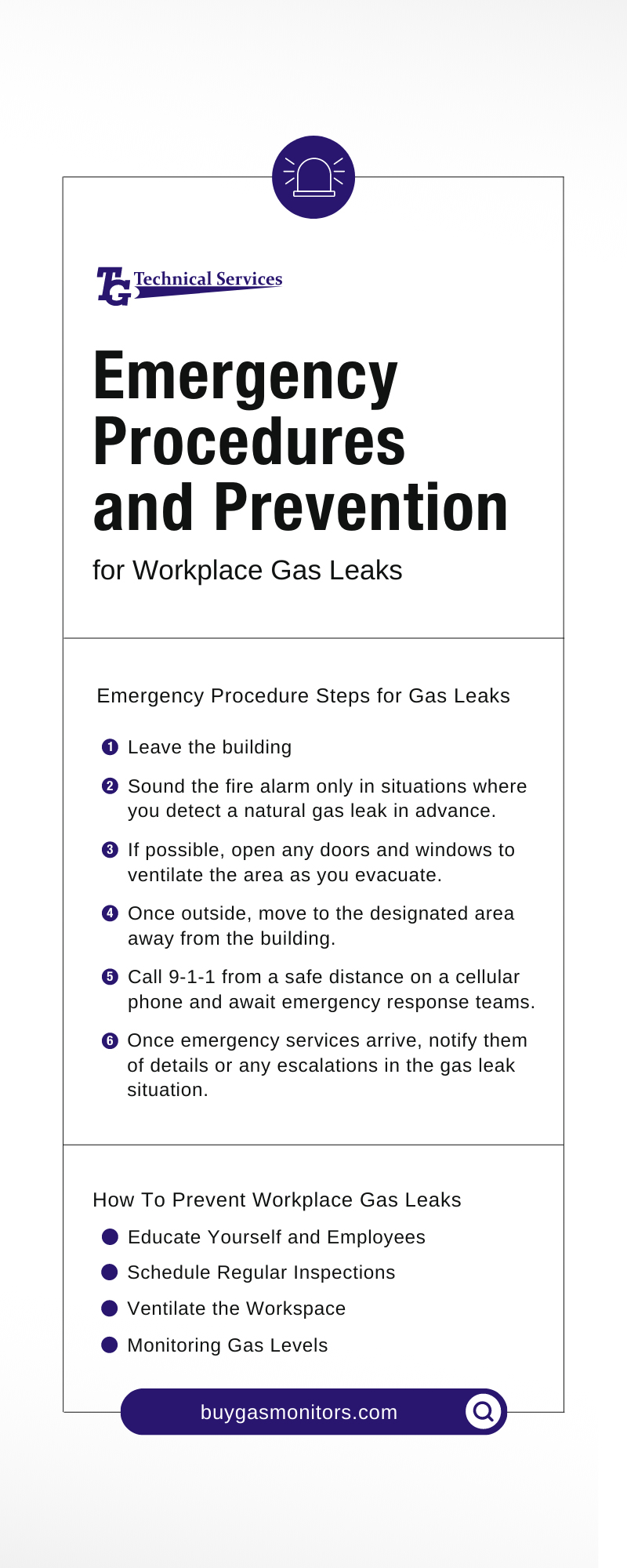Emergency Procedures and Prevention for Workplace Gas Leaks
Posted by William Kimmell on 22nd Mar 2022
Gas leaks are a common emergency to guard against in any industrial or equipment-based workplace. Many industrial applications and appliances utilize propane or natural gas, which can pose hazardous in some situations. This is why your business should understand the proper emergency procedures and prevention for workplace gas leaks. If you don’t already have an emergency plan in place, keep reading to better understand what to do in an emergency and how to prevent one in the first place. There are steps you can take to minimize the risk of a gas leak and respond to one more quickly. Learn how to minimize safety risks and protect your workplace.
Emergency Procedure Steps for Gas Leaks
If you detect a natural gas, propane, or carbon monoxide leak in the workplace or suspect signs of one, it’s important to follow the proper emergency safety steps.
- Leave the building: Gas leaks pose serious fire and safety hazards for all occupants of the building, so the first step is to leave the area and evacuate the building.
- Sound the fire alarm only in situations where you detect a natural gas leak in advance. You never want to turn on electrical switches, use phones, or ignite flames in an environment exposed to a gas leak.
- If possible, open any doors and windows to ventilate the area as you evacuate. However, in cases of a known gas leak, don’t spend unnecessary time opening doors or windows—evacuating the building should be your priority. Additionally, don’t use elevators or other electrical means of exit. Always use the stairs.
- Once outside, move to the designated area away from the building. Make sure all employees are there.
- Call 9-1-1 from a safe distance on a cellular phone and await emergency response teams.
- Once emergency services arrive, notify them of details or any escalations in the gas leak situation.
How To Prevent Workplace Gas Leaks
There are preventative measures you can put in place at your workplace to prevent an emergency scenario in the first place. By following proper safety steps, you can prevent gas leaks and know if one occurs. Here are some tips you can use to help prevent and prepare for the event of a gas leak.
Educate Yourself and Employees
The first step is to educate yourself and your employees on the importance and protocol of fire and gas safety. Make sure that your business has a proper emergency plan that outlines the steps above in place in the event of a gas leak. You and your employees should be aware of these emergency procedures. It is also important to regularly conduct safety drills so that your entire workplace knows where to go and how to act in an emergency. Additionally, familiarize yourself and your employees with the warning signs of a gas leak. Being able to identify early signs of a gas leak will help your workplace stay safe with a prompt response to these signs, keeping everyone out of danger.
Schedule Regular Inspections
Another step to prevent gas leaks is to schedule regular inspections and maintenance of all gas-related equipment. You should schedule regular inspections with a certified inspector for any gas lines, pipes, ductwork, and appliances in your building. Also, make sure you inspect this equipment to make sure it’s in proper working order. If your inspections uncover any damage, schedule a repair with a professional servicer immediately. Don’t delay when it comes to gas line or appliance repairs. Catching this damage early is an effective way to minimize the chances of gas leaks in your building. This is another area where you can train employees to monitor appliance conditions and notify you or managers when any issues arise.
Ventilate the Workspace
In the event of a gas leak, ventilate the area as much as possible to allow trapped gas to escape the space. However, proper workplace ventilation is important to prevent gas leaks and trapped gas in the first place. In professions that utilize a high volume of propane or natural gas equipment, make sure that you properly ventilate your factory or other workspaces with windows, air filters, and more. Opening windows and utilizing air filtration systems will ensure that there is enough air renewal in your space. You always want to make sure that your ventilation system cycles enough fresh air into a room. Some equipment and processing activities produce toxic fumes, which you need to capture and cycle out of the facility. This is primarily the case for laboratory and industrial facilities. Always ensure proper ventilation before using this equipment.
Monitoring Gas Levels
Another way to prevent gas leaks and predict emergencies is to monitor gas levels in your workplace. Gas monitoring is key for any facility that utilizes propane and natural gas equipment. Gas monitoring can also help monitor oxygen levels to keep your facility in a healthy range. You can utilize gas monitoring equipment to record gas and oxygen levels. There are different gas monitor options, so it’s important to consider which will be best for your facility.
Where To Find Gas Monitors
If you think your facility would benefit from gas monitoring technology, you can find a wide variety of gas monitoring equipment here at TG Technical Services. We offer a range of gas monitoring devices, including portable gas monitors, fixed gas monitors, and specialty equipment from a variety of brands. You can also find respiratory protection equipment for applications that involve toxic fumes. When it comes to workplace and employee safety and protection, TG Technical Services has you covered.
We hope that this walkthrough of the emergency procedures and prevention for workplace gas leaks has helped shed light on the proper safety measures for your workplace. If you haven’t already, make sure your business has a proper emergency response plan. You should also make sure your employees understand what to do in the event of an emergency and how they can help monitor and prevent gas leaks. These tips will help you keep your workplace safe and secure from gas-related emergencies.


